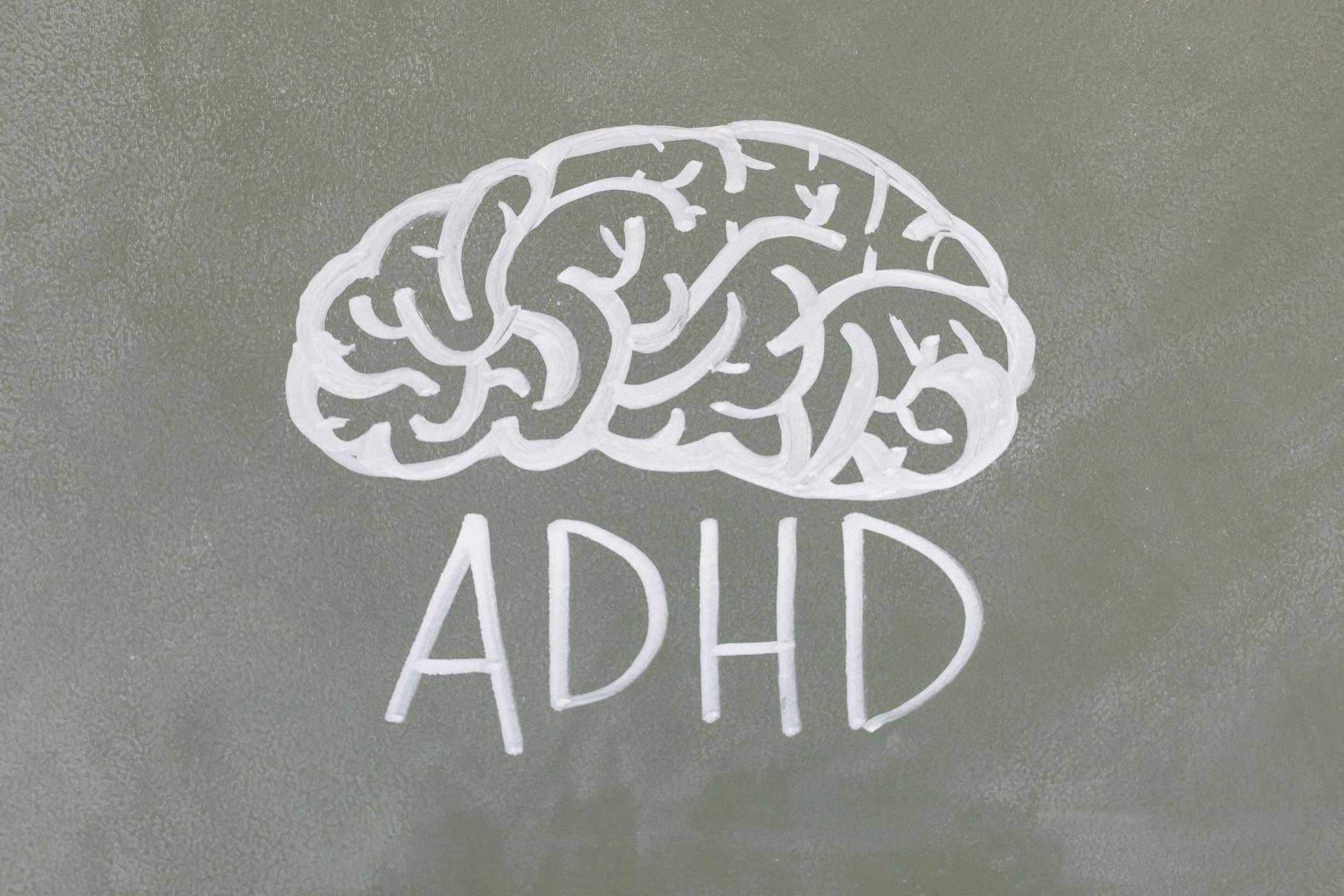What is the Connection Between ADHD and Overeating?
ADHD and overeating are often linked due to difficulties in emotional regulation, impulsivity, and food cravings. Many individuals with ADHD experience challenges related to emotional eating, sugar cravings, and binge eating, contributing to unhealthy eating patterns. Understanding how ADHD affects eating behaviors can help in developing strategies for better management and healthier lifestyle choices.
ADHD (Attention Deficit Hyperactivity Disorder) is a neurodevelopmental disorder that affects millions of people worldwide. While it is often associated with difficulties in focus, impulsivity, and hyperactivity, ADHD also impacts other areas of life, including eating habits. One of the lesser-discussed yet significant challenges that many individuals with ADHD face is overeating. This includes emotional eating, sugar cravings, and binge eating, which are often exacerbated by the impulsive and emotional regulation difficulties characteristic of the disorder
For people with ADHD, managing food intake can be especially challenging. In this article, we will delve into the connection between ADHD and overeating, discuss the underlying mechanisms that drive this relationship, and offer practical strategies for managing food cravings and improving eating habits. This guide is ideal for individuals with ADHD, caregivers, healthcare professionals, and anyone interested in better understanding the complex relationship between ADHD and overeating.
Why ADHD and Overeating Matter in 2025
The impact of ADHD on everyday life extends far beyond attention and concentration. Overeating, emotional eating, and food cravings are often overlooked symptoms of the disorder that can significantly affect an individual’s physical health and overall well-being. As ADHD diagnoses rise globally, it is becoming increasingly important to understand how this disorder influences eating behavior and how these behaviors can lead to long-term health consequences such as obesity, metabolic syndrome, and eating disorders like binge eating.
ADHD’s relationship with overeating is influenced by several interrelated factors, such as impulsivity, emotional dysregulation, and altered brain chemistry. Individuals with ADHD may find it harder to control their eating habits, leading to unplanned snacking, emotional eating, and overeating, especially in high-stress or emotionally charged situations. Over time, these eating patterns can contribute to weight gain and other health issues.
How ADHD and Overeating are Interconnected
The connection between ADHD and overeating is complex, involving various psychological and physiological mechanisms. Let’s explore the key factors that contribute to this relationship:
1. Impulsivity and Lack of Self-Control
Impulsivity is a core symptom of ADHD. This manifests not only in behaviors such as interrupting others or making hasty decisions but also in eating habits. People with ADHD often have difficulty resisting immediate desires and cravings. When it comes to food, this impulsivity means that individuals are more likely to eat without considering the consequences or whether they are truly hungry.
For example, a person with ADHD may impulsively reach for sugary or processed foods, even if they aren’t physically hungry, simply because the food is available or because it provides immediate satisfaction. This lack of impulse control can lead to overeating and poor food choices.
2. Emotional Dysregulation
Emotional dysregulation is another hallmark of ADHD. People with ADHD may experience intense emotions that are difficult to manage. In stressful or overwhelming situations, they may resort to food as a way of coping. This is where emotional eating comes into play. Emotional eating is characterized by using food to soothe negative emotions like stress, anxiety, or sadness, rather than eating because of true hunger.
This behavior is particularly prevalent in individuals with ADHD, as they may have a harder time managing their emotions effectively. For instance, after a stressful day at work or school, an individual with ADHD might binge eat to feel better, creating a cycle of overeating linked to emotional distress.
3. Difficulty with Executive Functioning
Executive functioning refers to a set of cognitive processes that help individuals plan, organize, and execute tasks. These processes are often impaired in individuals with ADHD. When it comes to eating, executive functioning plays a crucial role in regulating food intake and controlling impulse eating.
People with ADHD may struggle with planning meals, sticking to a routine, and making healthy food choices. They may also find it difficult to recognize when they’ve eaten enough, leading to overeating or binge eating. Additionally, poor executive functioning can result in forgetting to eat regular meals, leading to irregular eating patterns that increase the likelihood of impulsive snacking later.
4. Dopamine Imbalance and Food Cravings
Dopamine is a neurotransmitter that plays a key role in reward and pleasure. People with ADHD have lower levels of dopamine in certain areas of their brain, which is believed to contribute to their difficulty with motivation, attention, and impulse control. To compensate for this imbalance, individuals with ADHD often seek out pleasurable stimuli, including food, which can provide a temporary boost in dopamine levels.
High-sugar, high-fat foods, in particular, are highly rewarding to individuals with ADHD due to their ability to provide a quick spike in dopamine. This can lead to frequent cravings for sugary snacks and overeating, particularly during periods of low dopamine levels. The drive to satisfy these cravings can result in unhealthy eating patterns, including emotional eating and binge eating.
Practical Strategies to Manage ADHD and Overeating
Managing overeating in the context of ADHD requires a multi-faceted approach that addresses the underlying causes of impulsivity, emotional eating, and poor self-regulation. Here are some strategies that can help individuals with ADHD better manage their eating habits:
1. Mindful Eating Practices
Mindfulness is a powerful tool for improving self-awareness and emotional regulation. By practicing mindful eating, individuals with ADHD can become more attuned to their hunger cues and reduce the likelihood of impulsive eating. Mindfulness involves paying attention to the sensory experience of eating—such as the taste, texture, and smell of food—and being fully present during meals.
Mindful eating can help reduce emotional eating by encouraging individuals to focus on the experience of eating rather than using food as a coping mechanism. For example, when feeling stressed or anxious, taking a moment to pause, breathe, and focus on the food can help individuals recognize whether they are truly hungry or simply eating out of emotion.
2. Establish a Structured Meal Plan
One of the most effective ways to combat overeating in individuals with ADHD is to establish a structured eating routine. This includes having regular meal times and planning meals ahead of time. Having a set routine reduces the temptation to snack impulsively and helps prevent periods of hunger that might lead to overeating.
A structured meal plan also makes it easier to avoid unhealthy foods. By preparing healthy meals in advance and keeping nutritious snacks on hand, individuals with ADHD can limit their exposure to foods that trigger overeating or cravings. This structure helps to ensure that they are eating balanced, nutrient-dense meals rather than impulsively reaching for junk food.
3. Identify and Address Emotional Triggers
Emotional eating is a common problem for individuals with ADHD, and identifying emotional triggers is the first step in addressing this behavior. Keeping a food diary or journal can help individuals track their eating habits and pinpoint times when they eat in response to emotions such as stress, boredom, or sadness.
Once emotional triggers are identified, individuals can work on healthier coping strategies, such as exercise, meditation, or talking to a therapist. By learning to manage emotions in a healthier way, individuals can reduce the urge to turn to food for comfort.
4. Exercise Regularly
Regular physical activity has numerous benefits for individuals with ADHD, including improving mood and reducing impulsive behaviors. Exercise helps to regulate dopamine levels in the brain, providing a natural boost in mood and reducing the need for external sources of pleasure, like food.
Exercise can also help reduce stress, which is a common trigger for emotional eating. Engaging in physical activity on a regular basis can help individuals with ADHD better manage their emotions and reduce the likelihood of overeating. Activities like yoga, walking, cycling, or swimming are particularly beneficial for individuals with ADHD.
5. Seek Professional Support
Managing ADHD-related overeating can be challenging, and it is important to seek professional help when necessary. A therapist who specializes in ADHD or eating disorders can provide valuable support in addressing the psychological aspects of overeating. Cognitive-behavioral therapy (CBT), in particular, is effective for helping individuals recognize and change unhealthy eating patterns and emotional eating behaviors.
Nutritionists or dietitians who specialize in ADHD can also help develop a meal plan that supports both mental and physical health. These professionals can offer guidance on managing food cravings, portion control, and making healthier food choices.
Common Mistakes to Avoid When Managing ADHD and Overeating
When trying to manage overeating linked to ADHD, it’s easy to fall into common traps that can make the situation worse. Here are some common mistakes and how to avoid them:
Mistake: Relying solely on willpower
Solution: Willpower alone is not enough to manage impulsive eating behaviors. It’s important to build structure into your routine and use strategies like mindfulness to reduce impulsivity.
Mistake: Skipping meals to control weight
Solution: Skipping meals can increase hunger and cravings, which can lead to overeating later. Instead, focus on smaller, regular meals throughout the day.
Mistake: Ignoring emotional triggers for overeating
Solution: Identifying emotional triggers for overeating is key to breaking the cycle. Use journaling, therapy, or other coping strategies to manage stress and emotions without turning to food.
Mistake: Not addressing ADHD symptoms directly
Solution: Managing ADHD symptoms, such as impulsivity and emotional dysregulation, is critical in preventing overeating. Medication, therapy, or behavioral interventions can help manage ADHD more effectively.
Top Tools and Resources for Managing ADHD and Overeating
There are several tools and resources available to help individuals with ADHD better manage their eating habits:
- Mindfulness Apps
Apps like Headspace and Calm can help individuals practice mindfulness and meditation, which are effective in reducing emotional eating and managing stress. - Meal Planning Tools
Apps like MyFitnessPal and Eat This Much make it easier to track meals, manage portion sizes, and plan healthy eating habits. - Therapists Specializing in ADHD
Working with a therapist who understands ADHD can be invaluable. Cognitive-behavioral therapy (CBT) is especially effective for addressing overeating and emotional eating. - Exercise Programs
Platforms like Peloton or Nike Training Club provide convenient access to fitness programs, which can help improve mood and reduce overeating tendencies. - ADHD Support Groups
Joining an ADHD support group can provide emotional support and help individuals connect with others who understand the challenges of managing ADHD and overeating.
FAQ
How does ADHD affect overeating?
ADHD contributes to overeating through impulsivity, emotional dysregulation, and poor self-control, making it difficult for individuals to regulate their eating habits.
What is emotional eating in ADHD?
Emotional eating in ADHD is when individuals turn to food to cope with emotions like stress or anxiety, rather than eating because of physical hunger.
How can I control food cravings with ADHD?
Mindful eating, regular meals, addressing emotional triggers, and exercise can all help reduce food cravings linked to ADHD.
Can ADHD medication help with overeating?
ADHD medications may help improve impulse control, which can reduce overeating. However, it's important to consult with a healthcare provider before starting or adjusting medication.
Is sugar craving linked to ADHD?
Yes, individuals with ADHD are more likely to experience sugar cravings due to dopamine imbalance and impulsivity.
About the Author
Heather M. Hewett is a board-certified Traditional Naturopath, Clinical Nutritionist, and Holistic Health & Wellness Coach with over 22 years of experience. Drawing from her personal journey of overcoming binge eating, a 100-pound weight loss, and the reversal of autoimmune conditions like Hashimoto’s Thyroiditis and Fibromyalgia, Heather specializes in guiding neurodivergent individuals—particularly those with ADHD and autism spectrum traits—toward emotional resilience and a balanced relationship with food.
Through her integrative approach, Heather empowers clients to cultivate self-awareness, emotional regulation, and sustainable habits, helping them reclaim their health and happiness. She offers personalized coaching, group programs like "Love Your Food, Love Your Body," Resilience Circle, and masterclasses that combine nutrition, somatic therapy, and behavioral change strategies. Heather’s work is rooted in compassion, science-backed principles, and a deep understanding of the unique challenges faced by those with ADHD.





